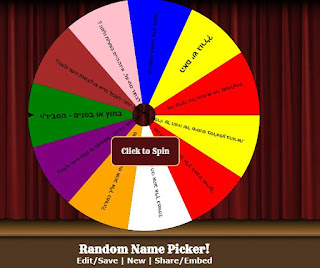As one of the Community Leaders for GEG IL, (Google Educator Groups of Israel)I have the inspiring opportunity to make it possible for teachers of languages who have a passion for incorporating teaching and technology, to get together and build amazing activities which they can then take back to their classrooms. Ideas give birth to other ideas, and teachers who come to these unique get-togethers find themselves learning, teaching and inspiring one another.
We had our third get-together with the GEG IL Teachers of Languages this past Thursday. The southern branch met in a beautiful new Youth Center in the southern city of Ofakim! We had tough competition (with the fast approach of Passover, many of our teachers have been racing against time to get their preparations and cleaning done). But a few determined souls from the south, with a passion for education and technology, tossed their dust rags aside for a few hours to join my highly competent co-community leader and favorite Google Ninja, Hanan Pearlman and me.
We began the session with the chairs set up as the seats in an airplane, and the passengers were given boarding cards.
The virtual travelers were invited to take their assigned seats, to buckle up and were served peanuts and grapejuice.... (as stocks of pink champagne have already been depleted) and then asked to list on the back of their boarding cards, any overweight baggage that could be left behind, in order to ease their flight. The "overweight baggage" (personal concerns, things they would rather leave behind from the field such as grading and marking and dealing with bureaucracy and behavior management, etc) was gathered in a suitcase, left behind in Terminal 1 in Ofakim, and we took off! (HT Howie Gordon for this clever ice-breaker!)
In order to become better acquainted with their fellow passengers, they interacted in threes and had questions to answer. We used Random Name Picker, a cool tool I wrote about a few weeks ago, and inserted the content we wanted. The questions were in Hebrew, since as Teachers of Languages in Israel, our common language is Hebrew. One person spun the wheel and asked the questions, the second passenger answered the question, the third wrote down the answers. Every three questions, they switched roles.
After the passengers had become more acquainted with their flight buddies, we watched a short TED talk about the art of speaking (how to be effective even when you really have nothing to say). We threw around the names and capabilities of some of the tools that WE know and love, and then embarked on our community's Mission for the Day: to devise activities for a language class that will encourage speaking in the target language and would be enhanced by incorporating technology.
At one point we were joined remotely via Hangout by some VIPs: the Chief English Inspector of Israel Dr. Tziona Levy, the Google Education Lead in Israel Yael Doron Drori, and Karen Eis, the leader of the GEG Tech Community. It was an exciting way to break the distance barrier and introduce into our session people of interest (and influence!) who could otherwise not have been there.
We wound up the gathering by watching a sample movie made by the one and only Rania Essa who motivates her students to speak in the target language by choosing topics that will be of interest to them and getting them to speak on camera! Finally, the teams shared the activities they devised! Each of the participants will be receiving a copy of the activity for implementation in their classrooms, if and when they wish, as well as all of the materials used during our day.
The object of our GEG communities is to break down the barriers between the different language teaching methodologies and SHARE! They present a unique opportunity to meet up with similarly passionate language teachers who would not normally collaborate together and share across the languages! We have communities in different parts of the country (so far - in addition to the Western Negev, we have had sessions in Haifa, Kfar Kassem and Jerusalem) and are looking for more potential leaders to open more branches of this community in other regions! If you are interested please contact me! The GEG IL Teachers of Languages community leaders collaborate to build our community together, and yet each community is free to fly in the direction that their members feel relevant.
Take a look at the plan for the coming sessions! I invite all teachers of languages to join us! Feel free to invite your colleagues from other languages, as well! Imagine the trickle-down effect this can have on your school - how bonding between teachers of Hebrew, Arabic, English and any other language being taught in your school, will pave the way to collaboration in order to speak the same "language of digital pedagogy" for teaching languages!
This is the plan for the remainder of the sessions this year. Please join us!
What would YOU like to do in YOUR community? If ideas are popping into your mind, please write suggestions in the comments, below, and we will incorporate them into our plans! The GEG IL for Teachers of Languages is YOUR COMMUNITY!
Wishing everyone a Happy Passover and great Spring Break!
Digitally yours,
@dele






























